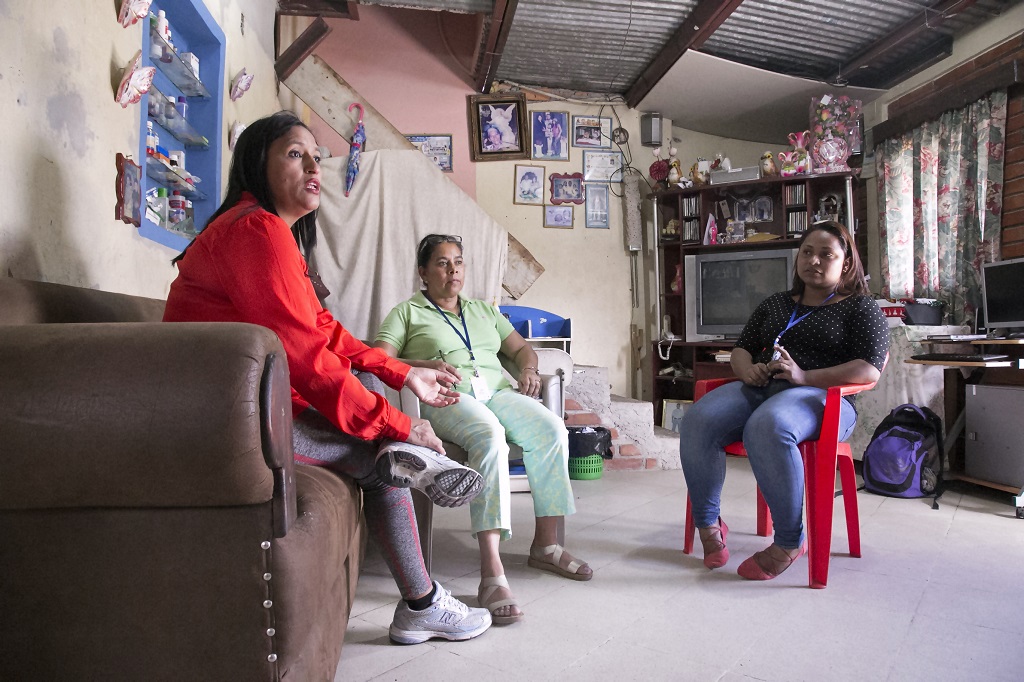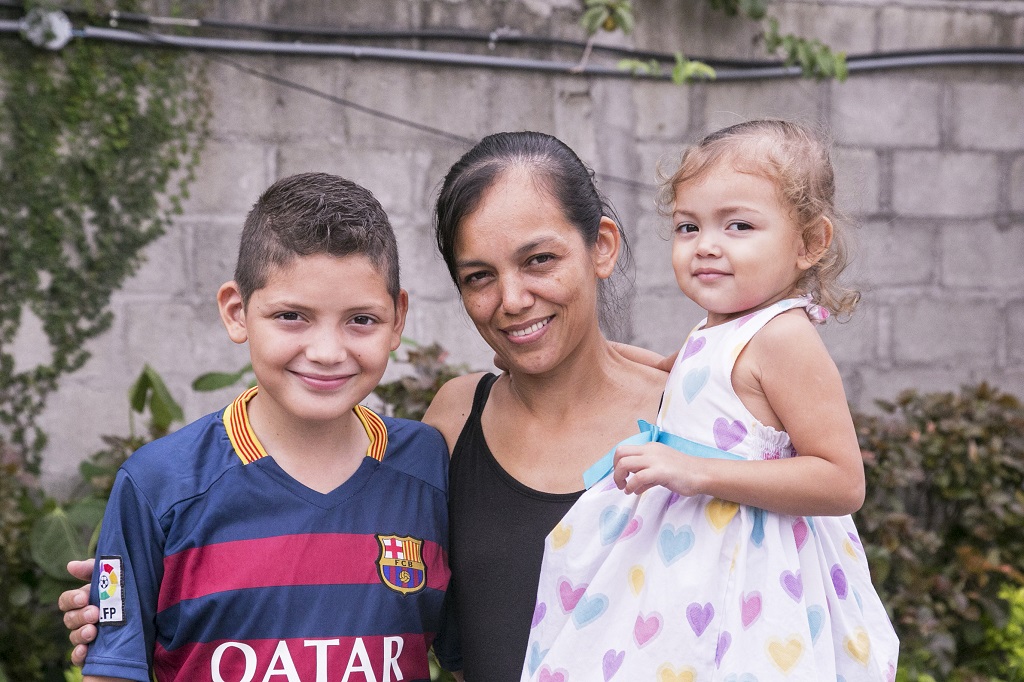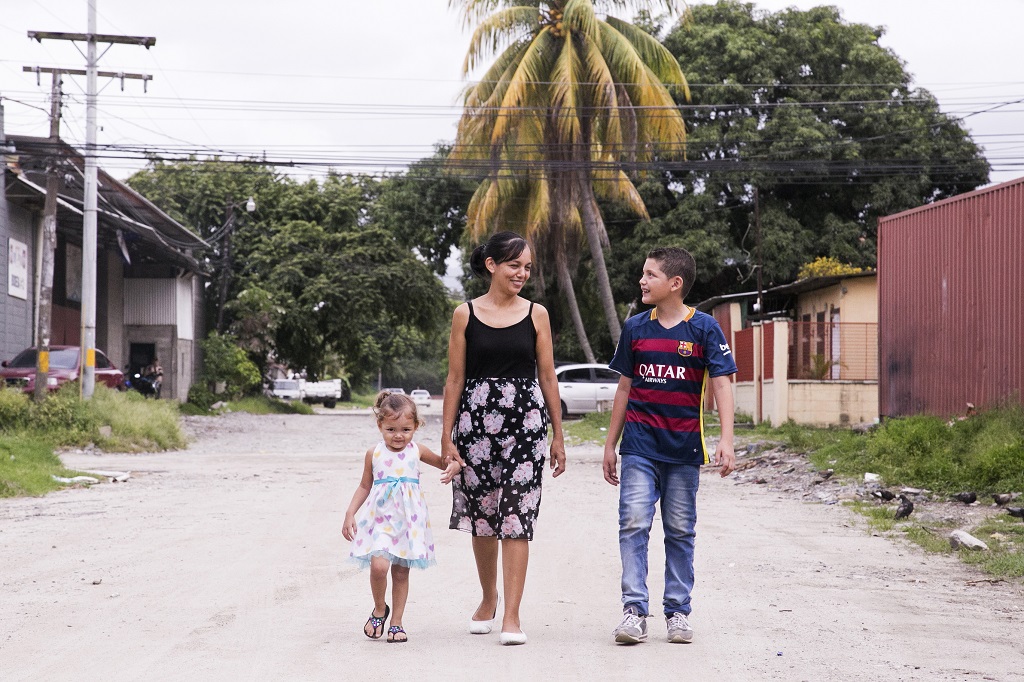Every few weeks, four women make their rounds in their neighborhood, called Tres de Mayo, on the outskirts of the Honduran capital of Tegucigalpa, where rival gangs have spurred high levels of crime and violence.
Nataly, Wendy, Karla and Marcia are checking in with the youth and families they work with through a violence prevention program called Proponte Más. The four women serve as a team of “family promoters” – community leaders who work directly with families to keep youth from increasing their risk for engaging with the gangs and violence that are all too common in the Tres de Mayo area.
"When I visited my first family and told them about the program, I was able to see how pleased they seemed when we showed an interest in their child." Wendy, Proponte Más family promoter
Proponte Más, a three-year project funded by the U.S. Agency for International Development and implemented by Creative Associates International, has trained 72 family promoters in five of the country’s most violent areas.
For families working hard to keep their kids safe, the regular visits have been a welcome support, says Wendy, one of the promoters.
“When I visited my first family and told them about the program, I was able to see how pleased they seemed when we showed an interest in their child,” she says. “That’s when the doors of their homes just open wide.”

Promoting a pathway from violence
Promoters like Wendy are trained by Proponte Más to walk families through activities and conversations aimed at making youth more resilient to the factors that may pull them toward crime and violence. The promoters work to build family bonds, improve parental supervision, strengthen communication and change risky behavior in youth.
“Getting families to establish positive behavior patterns is the most efficient way through which we can achieve positive changes in the country,” Wendy says.
Honduras, with a homicide rate of nearly 60 per 100,000 residents, is home to some of the world’s most dangerous cities.
Creative’s Citizen Security projects like Proponte Más see the family structure as the best asset to prevent youth from becoming a part of the cycle of violence and aim to help parents or guardians create home environments that are supportive and generate a sense of belonging for their children.
For example, in the Rivera Hernández neighborhood of San Pedro Sula, family promoters have helped repair the relationship between 11-year-old Ángel and his parents.
Family promoter coordinator Nolvia says the team in Rivera Hernández quickly recognized that much of Ángel’s disobedience toward his mother and other negative behaviors stemmed from his desire to no longer be treated as a young child.
The promoters worked with the family to help them understand one another, opening up and establishing more productive lines of communication.
“They helped me to understand that he is growing up and that he’s entering adolescence,” says Ángel’s mother Daisy.
After a few months of regular visits from promoters, Ángel is more respectful toward his parents, more helpful with household chores and doing better in school – all indications that he has reduced his risk for falling in with gangs.

Building resilience in youth across the risk spectrum
The promoters, who are working with more than 325 families, are one component of Proponte Más’ larger violence prevention programming.
The project administers a questionnaire called the Youth Service Eligibility Tool (YSET), which has been adapted to the Honduran context during the past four years, to gauge youths’ risk. The tool measures nine distinct risk factors that look at indicators such as attitudes, behaviors, relationships with peers, links to gangs, life at home and performance in school.
The results of the survey are used to match youth with the appropriate type of intervention – known in the violence prevention field as primary, secondary or tertiary.
Youth like Ángel are considered to be at a primary level. They show low risk for engaging with gangs, but are still considered at risk, often because of their exposure to such groups within their communities. Family promoters focus on maintaining primary youth at that level.
“Promoters have become lay counselors in their neighborhoods and are recognized for their innate skill sets." Robyn Braverman, Proponte Más Chief of Party
For youth at the secondary level, those whose risk factors show that they are on the verge of engaging with gangs, Proponte Más offers family counseling – a more intensive and formal version of the family promoter programming. Counselors work with youth one-on-one and with their families over the course of a year to lower risk factors, hopefully dropping into the primary level.
Proponte Más also works on tertiary violence prevention – aimed at youth who are already involved with gangs or have come in conflict with the law – by supporting organizations that assist youth reintegrating into society from the juvenile justice system.
Through working at all three levels simultaneously, Proponte Más is applying a place-based approach to preventing violence in key communities around the country.
Chief of Party Robyn Braverman says that while family counseling is at the heart of the project, promoters serve as the first line of defense and can be crucial in keeping youth from ever getting close to crossing a dangerous line.
“Promoters have become lay counselors in their neighborhoods and are recognized for their innate skill sets,” she says. “Proponte Más is creating a unique model of intervention with the primary group of kids and strengthening the lay counselors’ capacity to intervene.”

Making community support sustainable
Family promoters are working to strengthen their visibility and build relationships with other local organizations so that they can refer families who need additional support to the proper providers.
From April to June 2017, more than 40 primary-level families were connected to additional assistance such as education, recreational activities and health services.
Proponte Más promoters are honing their skills and understanding of family systems through continuing education and additional trainings. More than 60 family promoters are currently pursuing a diploma program funded through the Honduran National University.
Daisy Benítez, a program coordinator with Proponte Más partner Centro de Desarrollo Humano, says these opportunities for promoters allow them to have a bigger impact in families’ homes.
“They key to the teams’ success is strengthening the promoters’ capacity, as this gives them greater confidence during counseling,” she says. “This, and the fact that they belong to the community, makes families open up to them more.”
And by organizing family promoters into community-based networks, like the four promoters in Tres de Mayo, Proponte Más is ensuring that families will continue to have support long after the project’s formal end.
“I’ve had a wonderful experience as a promoter, so much so that these families are my family,” says Karla, one of the promoters in Tres de Mayo. “Even if they tell me that they don’t need me anymore, I’m going to continue doing what I do because I want to help the community.”
Edited by Evelyn Rupert
